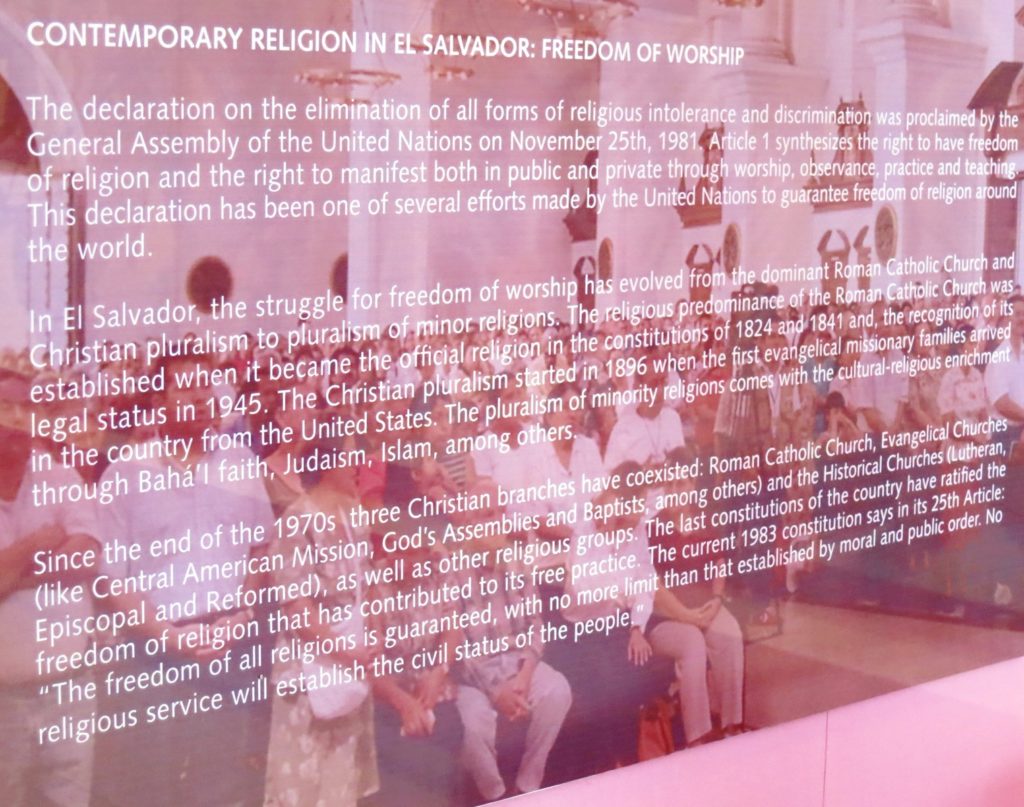PLANT – PRODUCE—COLLECT—SHARE
Seeds that go into the ground? No.
If you would think that this catchy slogan is an agricultural promo, you would be wrong. It was one of the many slogans used at our Lutheran church-wide event held in El Salvador. Clergy and lay members from Europe, North America, and South America gathered outside San Salvador in unity of Christian spirit.
The actual formal banner hanging over the delegates read:
Andaremos por el mundo con fey esperanza viva celebrando, cantando, sonriendo, luchando, por la vida
(Walk in the world with hope — singing, smiling, celebrating, living, hoping, fighting for life.)

Religion has played a role within the country since its indigenous Pipil roots. It produced gods and goddesses of nature which were blamed for every misfortune the people encountered, from infertility to disease. The serpent in primitive religion represented fertility, for example. A person who died a natural death was doomed to hell, whereas a person who died of a disease was given an afterlife.
During the country’s colonial period the various orders within the Roman Catholic Church dominated. In the 1970s three other Christian faiths joined the Catholic Church, and by 1981 freedom of religion was legislated.
In its Religion Room the MUNA (Museum of Anthropology) collage shows the nine main religions being represented and tolerated within El Salvador: Roman Catholic, Lutheran, Baptist, 7th Day Adventist, Mormon, Jehovah Witness, Islam, Hare Krishna, and Jewish.
Now there are numerous faiths and there SEEMS to be more of an ecumenical approach to faith. The Lutherans and Catholics in the same community will gather to host a meal for a visiting delegation, for example. Also, there is much overlap in the worship services between them.
It is not uncommon to see an endless number of small, I mean TINY churches almost side by side within the same small village/canton. A peek inside reveals hardly room for more than a dozen people. Many seem to be evangelical faiths. I haven’t figured out what doctrine each follows. Many seem to have lay pastors/leaders who take turns serving in various leadership roles. Even in the smallest cantons and villages of hard-working campesinos, worship services are held every single night. Yes, these people work all day in the fields or out in the fishing boats from 4 AM and attend worship every night! Some small churches of like faith gather together once a month for a joint outdoor worship service which we had the opportunity to be invited to participate in. It was an all-day combination worship/social event.

Some people we met have rejected the traditional formal church altogether because of its historical repression of the people. Others cannot forgive clergy whom they witnessed blessing the weapons which military used to kill innocents during the war. These people are more comfortable with a private spiritual life. What I so often hear people in this category verbalize is they see God in the people. Therefore they choose to experience their faith within that reality in the communities on a daily basis as opposed to inside a church structure once a week. I make no judgment whatsoever and respect that decision.
Although I’m sure there are some, it is rare for me to talk with someone who is not a believer. This country has options, opportunities, and freedoms for whatever people choose to believe in terms of a personal or group faith. Like their government, faith is no longer dictated.
A couple of other sayings during the Lutheran conference that brought a smile to many of us were, “We Salvadorans pray to God but carry a big stick in our hand,” and “Salvadorans are stubborn. The Lutheran Church may be very small, but it makes a lot of noise. When we find issues we feel strongly about, we approach the government, not to be provocative, but to offer alternatives as advocates.”
It was refreshing to hear that the believers in El Salvador are doers. Even some of those believers within the church who are frustrated, choose to remain because they feel you can only change things from the inside, not the outside. They are not content to attend service once a week and leave. They come often, if not daily, to be inspired by the Word, to find out who in their community needs help, what issues need solutions, which marches they can attend, how to organize themselves.
PLANT – PRODUCE—COLLECT—SHARE
(It’s not seeds; it’s the Word of God.)


